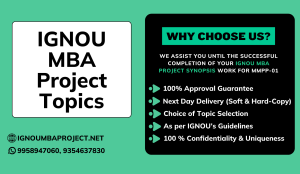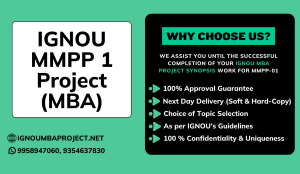An IGNOU MBA project is a mandatory research project that students enrolled in the Indira Gandhi National Open University (IGNOU) Master of Business Administration (MBA) program are required to complete. This project involves the application of theoretical knowledge to a real-world business problem by conducting research, analyzing data, and presenting their findings in a comprehensive report. The project is designed to demonstrate the students’ capacity to address management challenges within their chosen specialization area, such as finance, marketing, or human resource management. The project is typically referred to as “MMPP 1” or “MS 100” within the IGNOU curriculum.
What is the IGNOU MBA Project Documentation?
The IGNOU MBA Project Documentation is a comprehensive resource or set of instructions aimed at helping students understand the entire process of preparing, structuring, and submitting their MBA project report for IGNOU (Indira Gandhi National Open University). The guide typically provides clear, step-by-step details on how to complete each phase of the project, ensuring students meet the academic standards set by IGNOU.
Here’s what such a guide usually covers:
1. Introduction to the MBA Project
- An overview of the project’s importance in the MBA program.
- The project’s purpose is to apply theoretical knowledge to real-world business settings.
- A breakdown of the project’s impact on the final grade and degree completion.
2. Eligibility and Registration
- Eligibility requirements for beginning the MBA project (completion of core courses, minimum credits, etc.).
- Step-by-step instructions for registering a project, including proposal submission.
3. Choosing a Project Topic
- Guidelines for choosing a meaningful, realistic, and innovative project topic.
- How to integrate your project with your MBA expertise (finance, marketing, human resources, operations, etc.).
- The importance of selecting a topic that is both useful and researchable.
4. Project Proposal
- Details on how to create a project proposal.
- The proposal’s key components include objectives, research questions, methods, and predicted outcomes.
- How to obtain approval from your project supervisor.
5. Research Methodology
- A guide for choosing acceptable research methods (qualitative, quantitative, or mixed).
- Data collecting guidelines (including primary and secondary sources).
- Tools and methods for data analysis.
6. Writing the Project Report
- Formatting Guidelines: How to organize your project report (introduction, literature review, research methods, findings, analysis, and conclusion).
- Detailed directions for authoring each portion of the report, including the abstract, acknowledgments, and references.
- Citation formats (e.g., APA, MLA) and plagiarism policies.
7. Project Supervisor and Guidance
- The role of the project supervisor and how to communicate with them for feedback.
- How to revise based on the supervisor’s feedback.
8. Plagiarism Check
- Importance of ensuring that the project is original and meets academic integrity criteria.
- Steps for doing a plagiarism check, as well as the required similarity thresholds.
9. Submission Process
- Guidelines for submitting hard and soft copies of the project report.
- Documents needed for submission (e.g., project completion form, plagiarism report).
- Submission deadlines and how to track their status.
10. Viva Voce
- An explanation of the viva voce, or oral examination procedure.
- How to prepare for the viva (typical questions and presentation advice).
- What to expect during the viva, and how it will affect your final grade.
11. Project Evaluation and Grading
- A breakdown of the evaluation criteria (for example, project quality, methodology, originality, and writing).
- How the project affects your final MBA grade.
12. Post-Submission Considerations
- What to do if your project is rejected or needs to be resubmitted?
- Steps to follow after your project has been graded (appeals and revisions).
Sample of IGNOU MBA Project Documentation
- Job Satisfaction As A Function Of Job Involvement And Motivation In It Organization: A Case Study Of Xyz Company
- A Study On Occupational Stress Among Employees From Government And Private Sector Organization’s In XYC City
- Total Quality Management Development In Pharmaceutical Company: A Case Of Sun Pharmaceutical Industries Limited
- Concept Of Operation Management On Service Delivery At ITC Hotels Limited
- Customers Perception Towards The Consumers ‘cooperative Retail Stores: A Case Study Of Karnataka
- Influence Of Online Shops On The Consumer Shopping Habits And Behavior: A Case Study In Jammu City
- A Study To Evaluate The Financial Performance Of It Industry With Special Reference To Tata Consultancy Services (TCS)”
- Portfolio Management: A Case Study Of Investors In Xyz City
Is it mandatory to complete the project for obtaining an IGNOU MBA degree?
Yes, finishing the IGNOU MBA project is required to receive an IGNOU MBA degree. The project work is a vital component of the program since it gives students actual experience applying theoretical knowledge to real-world business challenges. It makes up a considerable percentage of the final evaluation and is necessary to demonstrate your ability to do research, analyze data, and contribute to your chosen field of study. Without successfully completing and submitting the project, you will not be given an MBA degree from IGNOU.
When should you start working on your IGNOU MBA Project?
It’s a good idea to start working on your MBA project well in advance to ensure ample time for research, data collection, analysis, writing, and revisions. Here are some pointers to help you plan:
- At least 6-8 months before the submission deadline: Ideally, you should start your project after finishing the majority of your coursework, particularly the fundamental topics, which frequently serve as the framework for your project. Starting early allows for more in-depth research and topic selection.
- After Proposal Approval: Once your project proposal has been accepted by the supervisor (which could take several weeks), you can begin collecting data and conducting research. If you’re collecting primary data, make sure to set aside enough time for surveys, interviews, and other data collection procedures.
- Plan for Delays: Starting early allows for any unanticipated obstacles, such as delays in data collecting, input from your supervisor, or time management issues.
- Regular Check-ins with Supervisor: Keep in touch with your project supervisor to ensure you’re on schedule and receive timely feedback as you go.
What are the eligibility criteria to begin the IGNOU MBA Project?
To begin your MBA project with IGNOU, you need to meet certain eligibility criteria. Here are the key requirements:
1. Completion of Core Courses
- You must have completed the MBA program’s core courses (first year subjects).
- Typically, this contains all compulsory classes from Semesters 1 and 2, such as Management Functions and Behaviour, Financial Accounting, Quantitative Methods, and so on.
- You must have completed the required number of courses before registering for the project.
2. Minimum Number of Credits
- To be eligible for project work, you must have earned at least a certain number of credits. This is normally between 40 and 60 credits, which signifies finishing a significant amount of the curriculum.
3. Registration for Project Work
- After completing the basic courses, you can apply for the project by submitting a proposal to your chosen supervisor.
- Before registering for the project, make sure that you meet the academic qualifications.
4. Approval of Project Proposal
- A supervisor must accept your project idea before you may begin working on it. The proposal usually include the topic, objectives, research questions, methodology, and data collection plan.
5. Completion of Pre-Project Assignments (if applicable)
- Depending on the specific needs of your profession (e.g., marketing, human resources, finance), you may be required to complete pre-project assignments or workshops on research methodology or project writing before beginning official work.
6. Good Academic Standing
- You must maintain a satisfactory academic standing and have no outstanding course arrears or failed assignments.
7. Submission of Registration Fee (if applicable)
- Before you begin working on the project, you may be required to pay a registration fee. Make sure to confirm any such information with the official IGNOU guidelines.
Should you submit a hard copy or a soft copy of the IGNOU MBA Project report?
For the IGNOU MBA project report, the submission requirements typically involve both hard copy and soft copy versions. Here’s what you need to know:
1. Hard Copy Submission
- You must send a physical copy of your project report to the regional center or study center where you have registered.
- This is the official copy that will be reviewed by your project supervisor and other examiners.
- The hard copy should be printed on A4 paper, properly bound, and structured according to the IGNOU specifications.
2. Soft Copy Submission
- In addition to the physical copy, you must provide a soft copy of the project report. This is often done by email or the IGNOU’s web portal (if available).
- The soft copy should be in PDF format and perfectly match the hard copy’s content.
- Make sure the soft copy is correctly named (e.g., “MBA_Project_YourName.pdf”).
Submission Process
- Hard Copy: Send the hard copy, along with any relevant forms (such as the project completion form), to your regional center.
- Soft Copy: Send the soft copy to the specified email address or upload it to the IGNOU site, as directed. Include any supplementary documents that have been requested (for example, plagiarism reports).
Check out: Ace Your Studies with Expert IGNOU Assignments
What qualifications should the supervisor have?
The qualifications of the supervisor for an IGNOU MBA project are crucial to ensure that the student receives appropriate guidance throughout the process. The ideal qualifications include:
Academic Qualifications:
- The supervisor should have a postgraduate degree (MBA or equivalent) in the relevant field of study.
- A doctoral degree (Ph.D.) in a relevant field is frequently preferred, particularly for research-intensive projects.
Relevant Experience:
- The supervisor should have extensive academic experience teaching MBA-level courses, especially in the student’s chosen specialty (e.g., Marketing, Finance, Human Resources, Operations).
- Practical experience in a business or industry linked to the student’s project topic is advantageous because it increases the project’s real-world relevance.
Research Expertise:
- The supervisor should have extensive research experience, ideally having published papers or projects in the relevant subject.
- Experience monitoring student projects and leading research work is essential for delivering effective mentorship.
Communication Skills:
- The supervisor must communicate effectively with the student, giving clear directions and positive criticism.
- Availability and desire to participate in regular progress reviews.
Adherence to Academic Integrity:
- The supervisor should be committed to upholding academic standards and ensuring that the project adheres to ethical research requirements.
Conclusion
In conclusion, the IGNOU MBA Project Documentation guide is a very useful tool that demystifies the whole process of a project, from the selection of a topic to the final submission. It gives a clear, step-by-step roadmap that helps students navigate the complexities of research, data analysis, report writing, and even the viva voce. The guide ensures that every student is well-prepared to meet the academic standards and expectations of IGNOU by outlining eligibility criteria, project proposal requirements, research methodologies, and submission guidelines.
For many, this MBA project appears daunting at the outset, but with this book, you should be able to break down what is otherwise an overwhelming process into manageable steps, encouraging you to start early and maintain regular contact with your supervisor, as well as strictly follow formatting and guidelines on originality. In conclusion, successfully completing your MBA project not only contributes to earning the degree but also provides you with the necessary tools to solve real-world business challenges. Adopting this approach will undoubtedly lead to a rewarding academic and professional journey.






